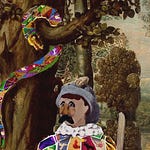IV. DÉCONVENUE
Les convives, fourchette au poing, Ont vu subtiliser les litres, Les rôtis, les tourtes, les huîtres, Et les confitures de coing.
Des Gilles, cachés dans un coin, Tirent des grimaces de pitres : Les convives, fourchette au poing, Ont vu subtiliser les litres.
Pour souligner le désappoint, Des insectes aux bleus élytres Viennent cogner les roses vitres, Et leur bourdon nargue de loin Les convives, fourchette au poing.
IV. BAD LUCK
The guests, with fork in fist, have seen the bottles vanish, the roasts, meat-pies, and oysters, and the quince marmalade.
Gilleses, hidden in a corner, make tomfool grimaces: the guests, with fork in fist, have seen the bottles vanish.
To underline the guests’ bad luck, some insects with blue wing-covers come to knock on the rosy windows, and their drone mocks from far away the guests, with fork in fist.
NOTES (by line number starting with the title).
1 This is rondel XIII, otherwise untitled, in RB1883.
DÉCONVENUE : « Malheur, mauvais succès » (DAf1878), ‘misfortune or bad outcome’, not ‘disappointment’, much less a mere feeling of disappointment.
3 subtiliser : This verb, attested as an alchemical term of art before the 15th century, verges into an early chemical sense by the 16th century and in the 19th century begins to be used in a modern chemical sense (that of ‘to sublimate’, i.e., to pass directly from the solid phase of matter to the gaseous without passing through a liquid phase). It is attested in the sense of ‘to act skillfully’ in the 15th century, and in the more specific sense of ‘to rob adroitly’ in the 18th century. In his RB1883 version of this rondel, Giraud uses the less specific (and much less intriguing!) « disparaître », ‘disappear’, in place of « subtiliser ».
litres : Litre, a neologism based on Middle French litron (a measure of volume) < Late Latin litra (a liquid measure) < Greek λίτρα (a measure of weight). France’s « loi du 18 germinal an III » (7 April 1795) introduced litre as the metric unit of volume. Pierrot would not have encountered the word until late in his long career and far from Bergamo; but Giraud would have (Belgium adopted the metric system in 1830). As used in this rondel it is a compound metonymy, litre (unit of volume) standing for a bottle (of that volume) and a bottle standing for wine or spirits (the contents of that bottle). Given that alcohol was one of the (al)chemical substances subjected to subtilisation, I can easily believe Giraud’s final choice of « subtiliser » was a deliberate equivocation.
5 confitures de coing : All editions of DAf define marmalade; only the current edition notes its derivation from Portuguese marmelada, « confiture de coing ».
6 Des Gilles : As with « Crispins » in I.10, the pluralization of « Gilles » (invisible in the word standing alone, but clear from both the pluralized participial adjective « cachés » and the indeterminate plural article « Des ») emphasizes the stock-character nature of the role. This is Gilles’s only appearance in the book.
7 In RB1883 this line ends with a full stop, not a colon.
11 insectes : Here RB1883 has « phalènes », defined in DAf 1835 as the name « que les naturalistes donnent aux papillons nocturnes, pour les distinguer des papillons de jour », ‘which naturalists give to nocturnal lepidopterans to distinguish them from diurnal lepidopterans’. (See XIX.1.)
élytres : Elytra (plural of elytron) are modified, hardened forewings of various insects, mostly beetles; for example, the ladybird beetle’s red ‘wings’ with black dots are elytra. Moths and butterflies have no elytra (which may be why Giraud replaced « phalènes » with « insectes »).
12 roses vitres : This is a « faux ami »—a ‘false friend’ in the sense of M. Koessler and J. Derocquigny, Les faux amis; ou, Les trahisons du vocabulaire anglais (conseils aux traducteurs) (Paris, Vuibert, 1931): the French for ‘rose window’ is rosace; in English, « roses vitres » are simply ‘rose-colored windows’.
13 bourdon : As defined by F. J. Noem and C. P. Chapsal, Nouveau Dictionnaire de la Langue Française: « T. de mus. ton qui sert de basse continuelle à la vielle, à la musette, etc. », ‘musical Term for a tone that serves as basso continuo of a hurdy-gurdy, a bagpipe, etc.’: in short, a drone. Other meanings of « bourdon » are bumblebee; or, among beekeepers, male honeybee (that is, another kind of drone!); or, among printers, a failure to typeset one or more lines of copy. The first two of these might well have been on Giraud’s mind, and perhaps even the third, given his wide involvement (both editorial and authorial) with many Belgian literary magazines—Jeune Belgique, Revue Moderne, Correspondant Belge, Revue Artistique, etc.—during the period when he was writing Pierrot Lunaire.
nargue : As a noun, « nargue », ‘mockery’, appears in all editions of DAf, glossed as a term of raillery and disdain; the verb narguer, ‘to mock’, appears in DAf1762 through DAf1878 as slang, and since DAf1935 as standard French. Many etymologists trace the verb (whence the noun) to Vulgar Latin *naricāre, variously (and incompatibly) glossing their philological recreations as « froncer le nez », ‘to wrinkle the nose’ (Littré); « tirer le nez », ‘to pull the nose’ (Scheler); « parler du nez », ‘to talk through the nose’ (Picoche); and « far nèc gnèc » (de Chambure: his gloss is Italian dialect), presumably equivalent to the childish taunt ‘nyah-nyah!’ in English. Both of the last two glosses fits « bourdon » nicely, but I have no evidence that Giraud was aware of either .











Share this post